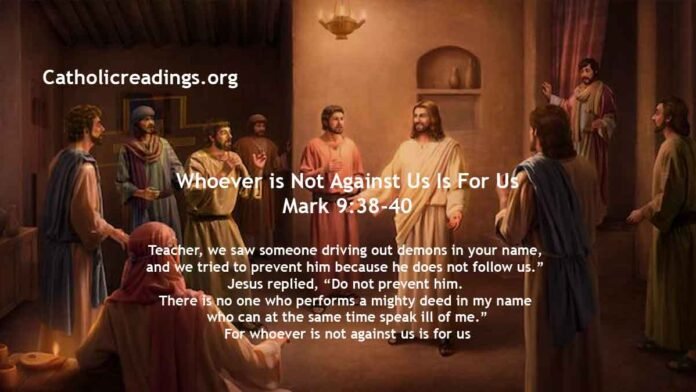When Yahweh descended and shared His spirit with the elders, Eldad and Meldad were not present in the group of elders but they also received the Spirit of Yahweh. So, when they prophesied, some of the elders asked Moses to stop them as they did not belong to the group. The same happened to the apostles. When the apostles saw a person using the name of Christ in driving out demons, they stopped him because he did not belong to the group of the Apostles. Just as Moses corrected the elders, wishing that all be prophets, so Jesus Christ also corrected His Apostles saying to them: “Anyone who is not against us is for us” (Mk 9:40).
We, human persons, have the usual tendency to be exclusivists. By nature, we belong already to a family and a society. By our common activities, we also belong to a group of people such as our study group or classmates, our work group or co-workers, recreation group or playmates and worship group or co-believers. Still we create a lot of groups such as school batches and clans where in we organize a lot of reunions. Such groups where we belong are a help for us to not only understand our social, political and religious nature and encounter our acceptance and belongingness but also attain our fulfillment in life. And such groups as helps are good for us except when they become exclusivists and thus destroy relationships.
In our case, usually our too much attachments to groups make us too exclusivists to the detriment of our relationship with other people that do not belong to our groups. Like the elders and the apostles, we try to stop them, to exclude them from our company, and even to ignore and go against them. We have to remember and learn from the fact that the societies are being destroyed by extreme exclusivist groups such as the Nazi regiment, the communists and even some fraternities. We have to know that groups should be a help in fostering relationship among the members and even between the members of the group and the non-members. Any destruction of such relationships emerges only from the unhealthy attachment to groups.
In the readings, we have seen how Moses and Jesus corrected the elders and the Apostles in their erroneous concepts of a group. Christianity then as willed by Christ must not lead to an exclusivist group or religion but must initiate a better and mature relationship between the Christians and the non-Christians. For this reason, Jesus Christ’s wish for all his disciples is expressed in His words that say: “that all may be one” (Jn 17:22). Faithful to these words of Jesus, our Catholic Church is very active in the ecumenism that began through the efforts of some protestant churches. With these statements of Jesus “Anyone who is not against us is for us” and “that all may be one”, we believe that our Holy Catholic Church, even though she admits the truth that all the graces needed by the faithful in order to be saved are already contained in her, yet she recognizes the fact that there are some vestiges of truth and graces in other Christian sects and even other religions and that salvation is also open to those who do not belong to the Holy Catholic Church. As Catholics, therefore, we must not have an exclusivist mentality of salvation that says that only the catholic faithful will be saved; we cannot even say, as Christians, that only Christians can be saved and have eternal life.
Christ’s words teach us also the virtue of tolerance. The world is not our own and the things in the world do not function as we want them to be. There are then persons, things and events that we do not like, yet we have to live with them as they too belong to the world where we are part of. We are born here on earth with a specific kind of culture and mentality. But there are also people who are born in different place from ours, in different ambience and culture and even mentality. With those people, we have to respect their culture and mentality. We cannot force our own culture or mentality to them. We have to understand them and be able to live with them. We must also respect their right to express their own thinking. Nobody holds the whole truth. We cannot thus say that what we think and say are always correct. We have to know and give to these people their rights to think differently from us and express such kind of thinking.
“Anyone who is not against us is for us.” These words of Jesus emphasize not the division but rather the unity. With these words, Christ does not give importance those who are against Christianity but focuses more on those who belong to Christianity by adhering to His teachings. As Christians, we too must be like Christ, not to sow hatred and division in the society but to spread love and unity among the people. What is important is the unity of the society and of the whole mankind. It is in unity that peace and success can be attained. Unity thus is instrumental in the growth of the people and the development of the society. We can do this by beginning with ourselves.
TWENTYSIXTH SUNDAY IN ORDINARY TIME
(Green) Cycle B/Year I (September 26, 2021)
Nm 11:25-29/Jas 5:1-6/Mk 9:38-43, 47-48



























